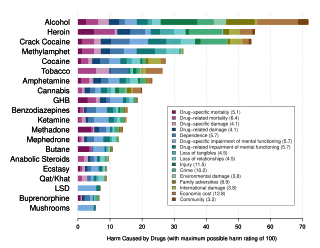The Norwegian Institute for Alcohol and Drug Research (Norwegian : Statens institutt for rusmiddelforskning, SIRUS) was a social science research institute based in Oslo, Norway. On 1 January 2016 the institute was incorporated into the Norwegian Institute of Public Health.
It was established in 2001 as the result of the merger of the National Institute for Alcohol and Drug Research (SIFA) and a department within the Norwegian Directorate for Health and Social Affairs. Organizationally, it was subordinate to the Norwegian Ministry of Health and Care Services, but claimed to be independent. It was also a part of the European Monitoring Centre for Drugs and Drug Addiction.
In addition to various aspects of drugs, alcohol and tobacco use, it researched gambling addiction.

Alcoholism is the continued drinking of alcohol despite it causing problems. Some definitions require evidence of dependence and withdrawal. Problematic use of alcohol has been mentioned in the earliest historical records. The World Health Organization (WHO) estimated there were 283 million people with alcohol use disorders worldwide as of 2016. The term alcoholism was first coined in 1852, but alcoholism and alcoholic are sometimes considered stigmatizing and to discourage seeking treatment, so diagnostic terms such as alcohol use disorder or alcohol dependence are often used instead in a clinical context.

Substance abuse, also known as drug abuse, is the use of a drug in amounts or by methods that are harmful to the individual or others. It is a form of substance-related disorder. Differing definitions of drug abuse are used in public health, medical, and criminal justice contexts. In some cases, criminal or anti-social behavior occurs when the person is under the influence of a drug, and long-term personality changes in individuals may also occur. In addition to possible physical, social, and psychological harm, the use of some drugs may also lead to criminal penalties, although these vary widely depending on the local jurisdiction.
The Substance Abuse and Mental Health Services Administration is a branch of the U.S. Department of Health and Human Services. SAMHSA is charged with improving the quality and availability of treatment and rehabilitative services in order to reduce illness, death, disability, and the cost to society resulting from substance abuse and mental illnesses. The Administrator of SAMHSA reports directly to the Secretary of the U.S. Department of Health and Human Services. SAMHSA's headquarters building is located outside of Rockville, Maryland.

Drug rehabilitation is the process of medical or psychotherapeutic treatment for dependency on psychoactive substances such as alcohol, prescription drugs, and street drugs such as cannabis, cocaine, heroin, and amphetamines. The general intent is to enable the patient to confront substance dependence, if present, and stop substance misuse to avoid the psychological, legal, financial, social, and medical consequences that can be caused.
The gateway drug effect is a comprehensive catchphrase for the often observed effect that the use of a psychoactive substance is coupled to an increased probability of the use of further substances. Possible reasons for the connection include environmental influence, impulsive people seeking both soft and hard drugs, alterations in the brain due to earlier substance exposure, as well as similar attitudes of people who use different substances, and therefore experience a "common liability to addiction". In 2020, the National Institute on Drug Abuse released a research report which supported allegations that marijuana is a "gateway" to more dangerous substance use; one of the peer-reviewed papers cited in the report claims that while "some studies have found that use of legal drugs or cannabis are not a requirement for the progression to other illicit drugs [...] most studies have supported the "gateway sequence"." However, a 2018 literature review conducted by the National Institute of Justice, which analyzed 23 peer-reviewed research studies, concluded "that existing statistical research and analysis relevant to the "gateway" hypothesis has produced mixed results", and that "no causal link between cannabis use and the use of other illicit drugs can be claimed at this time."
Substance dependence, also known as drug dependence, is a biopsychological situation whereby an individual's functionality is dependent on the necessitated re-consumption of a psychoactive substance because of an adaptive state that has developed within the individual from psychoactive substance consumption that results in the experience of withdrawal and that necessitates the re-consumption of the drug. A drug addiction, a distinct concept from substance dependence, is defined as compulsive, out-of-control drug use, despite negative consequences. An addictive drug is a drug which is both rewarding and reinforcing. ΔFosB, a gene transcription factor, is now known to be a critical component and common factor in the development of virtually all forms of behavioral and drug addictions, but not dependence.
The Royal Norwegian Ministry of Health and Care Services is a Norwegian government ministry in charge of health policy, public health, health care services, and health legislation in Norway. It is led by the Minister of Health and Care Services.
JamesGriffith Edwards CBE was a British psychiatrist.

The Norwegian Institute of Public Health (NIPH) is a Norwegian government agency and research institute, and is Norway's national public health institute. It is subordinate to the Ministry of Health and Care Services. NIPH acts as a national competence institution in public health in a broad sense for governmental authorities, the health service, the judiciary, prosecuting authorities, politicians, the media and the general public, international organisations and foreign governments. The institute has around 1400 employees.
The modern disease theory of alcoholism states that problem drinking is sometimes caused by a disease of the brain, characterized by altered brain structure and function. Today, alcohol use disorder (AUD) is used as a more scientific and suitable approach to alcohol dependence and alcohol-related problems.
An addictive behavior is a behavior, or a stimulus related to a behavior, that is both rewarding and reinforcing, and is associated with the development of an addiction. There are two main forms of addiction: substance use disorders and behavioral addiction. The parallels and distinctions between behavioral addictions and other compulsive behavior disorders like bulimia nervosa and obsessive-compulsive disorder (OCD) are still being researched by behavioral scientists.

Substance abuse prevention, also known as drug abuse prevention, is a process that attempts to prevent the onset of substance use or limit the development of problems associated with using psychoactive substances. Prevention efforts may focus on the individual or their surroundings. A concept that is known as "environmental prevention" focuses on changing community conditions or policies so that the availability of substances is reduced as well as the demand. Individual Substance Abuse Prevention, also known as drug abuse prevention involves numerous different sessions depending on the individual to help cease or reduce the use of substances. The time period to help a specific individual can vary based upon many aspects of an individual. The type of Prevention efforts should be based upon the individual's necessities which can also vary. Substance use prevention efforts typically focus on minors and young adults — especially between 12–35 years of age. Substances typically targeted by preventive efforts include alcohol, tobacco, marijuana, inhalants, coke, methamphetamine, steroids, club drugs, and opioids. Community advocacy against substance use is imperative due to the significant increase in opioid overdoses in the United States alone. It has been estimated that about one hundred and thirty individuals continue to lose their lives daily due to opioid overdoses alone.
Wayne Denis Hall (AM) is an Emeritus Professor at the National Centre for Research on Youth Substance Use Research. He was Inaugural Professor and Director of the Centre for Youth Substance Abuse Research at the University of Queensland (2013-2016), an NHMRC Australia Fellow at the University of Queensland Centre for Clinical Research (2010-2013), Professor of Public Health Policy in the School of Population Health (2005–2010) and Director of the Office of Public Policy and Ethics at Institute for Molecular Biosciences (2001–2005), at the University of Queensland. He is also a Fellow of the Academy of the Social Sciences in Australia. He has written widely on the ethical and policy issues associated with the genetics and neurobiology of addiction, mental disorders and cancer.
Addiction is a monthly peer-reviewed scientific journal established in 1903 by the Society for the Study of Addiction to Alcohol and other Drugs as the British Journal of Inebriety. It was renamed British Journal of Addiction to Alcohol & Other Drugs in 1947, then renamed to British Journal of Addiction in 1980, before finally obtaining its current name in 1993. It covers research relating to the abuse of alcohol, illicit drugs, and tobacco, as well as behavioural addictions. The editor-in-chief is John Marsden.
The alcohol industry, also known as Big Alcohol, is the segment of the commercial drink industry that is involved in the manufacturing, distribution, and sale of alcoholic beverages. The industry has been criticised in the 1990s for deflecting attention away from the problems associated with alcohol use. The alcohol industry has also been criticised for being unhelpful in reducing the harm of alcohol.

Substance use disorder (SUD) is the persistent use of drugs despite substantial harm and adverse consequences to self and others. Related terms include substance use problems and problematic drug or alcohol use.

Addiction is a neuropsychological disorder characterized by a persistent and intense urge to use a drug or engage in a behavior that produces natural reward, despite substantial harm and other negative consequences. Repetitive drug use often alters brain function in ways that perpetuate craving, and weakens self-control. This phenomenon – drugs reshaping brain function – has led to an understanding of addiction as a brain disorder with a complex variety of psychosocial as well as neurobiological factors that are implicated in addiction's development.
Addiction psychiatry is a medical subspecialty within psychiatry that focuses on the evaluation, diagnosis, and treatment of people who have one or more disorders related to addiction. This may include disorders involving legal and illegal drugs, gambling, sex, food, and other impulse control disorders. Addiction psychiatrists are substance use disorder experts. Growing amounts of scientific knowledge, such as the health effects and treatments for substance use disorders, have led to advancements in the field of addiction psychiatry. These advancements in understanding the neurobiology of rewarding behavior, along with federal funding, has allowed for ample opportunity for research in the discipline of addiction psychiatry. Addiction psychiatry is an expanding field, and currently there is a high demand for substance use disorder experts in both the private and public sector.
The Center of Alcohol Studies (CAS) is a multidisciplinary research institute located in the Busch Campus of Rutgers University, which performs clinical and biomedical research on alcohol use and misuse. The center was originally at Yale University and known as the Yale Center of Alcohol Studies, before it moved to Rutgers in 1962. The CAS is also home to the peer-reviewed Journal of Studies on Alcohol and Drugs (JSAD), the oldest journal on alcohol studies; and a library of alcohol literature. Early research in the 1940s at the CAS helped support the disease model of addiction that helped change public perception on alcohol consumption.

Shanthi Ranganathan is an Indian social worker and the founder of T. T. Ranganathan Clinical Research Foundation, a non governmental organization managing the TTK Hospital, a medical centre based in Chennai for the treatment and rehabilitation of drug and alcohol addicts. She is the first recipient of the UN Vienna Civil Society Award and a recipient of the 1992 Padma Shri, the fourth highest civilian award from the Government of India for her contributions to the society.